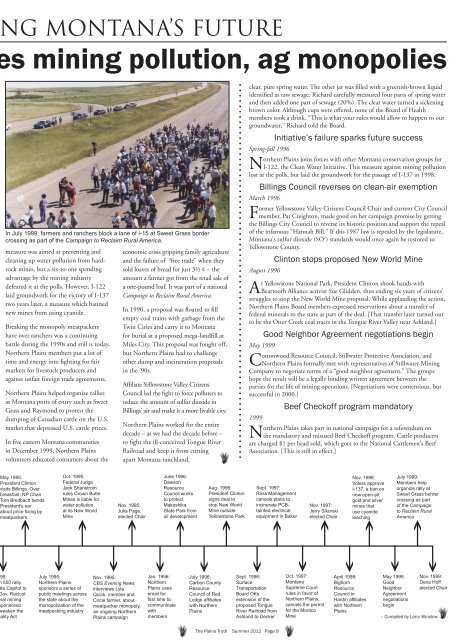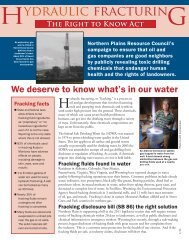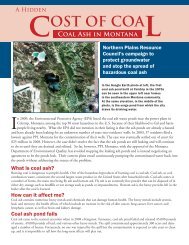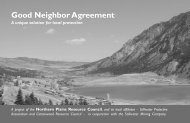Summer - Northern Plains Resource Council
Summer - Northern Plains Resource Council
Summer - Northern Plains Resource Council
Create successful ePaper yourself
Turn your PDF publications into a flip-book with our unique Google optimized e-Paper software.
ng montana’s future<br />
es mining pollution, ag monopolies<br />
In July 1999, farmers and ranchers block a lane of I-15 at Sweet Grass border<br />
crossing as part of the Campaign to Reclaim Rural America.<br />
measure was aimed at preventing and<br />
cleaning up water pollution from hardrock<br />
mines, but a six-to-one spending<br />
advantage by the mining industry<br />
defeated it at the polls. However, I-122<br />
laid groundwork for the victory of I-137<br />
two years later, a measure which banned<br />
new mines from using cyanide.<br />
Breaking the monopoly meatpackers<br />
have over ranchers was a continuing<br />
battle during the 1990s and still is today.<br />
<strong>Northern</strong> <strong>Plains</strong> members put a lot of<br />
time and energy into fighting for fair<br />
markets for livestock producers and<br />
against unfair foreign trade agreements.<br />
<strong>Northern</strong> <strong>Plains</strong> helped organize rallies<br />
at Montana ports of entry such as Sweet<br />
Grass and Raymond to protest the<br />
dumping of Canadian cattle on the U.S.<br />
market that depressed U.S. cattle prices.<br />
In five eastern Montana communities<br />
in December 1999, <strong>Northern</strong> <strong>Plains</strong><br />
volunteers educated consumers about the<br />
economic crisis gripping family agriculture<br />
and the failure of “free trade” when they<br />
sold loaves of bread for just 3½ ¢ – the<br />
amount a farmer got from the retail sale of<br />
a one-pound loaf. It was part of a national<br />
Campaign to Reclaim Rural America.<br />
In 1990, a proposal was floated to fill<br />
empty coal trains with garbage from the<br />
Twin Cities and carry it to Montana<br />
for burial at a proposed mega-landfill at<br />
Miles City. This proposal was fought off,<br />
but <strong>Northern</strong> <strong>Plains</strong> had to challenge<br />
other dump and incineration proposals<br />
in the ’90s.<br />
Affiliate Yellowstone Valley Citizens<br />
<strong>Council</strong> led the fight to force polluters to<br />
reduce the amount of sulfur dioxide in<br />
Billings’ air and make it a more livable city.<br />
<strong>Northern</strong> <strong>Plains</strong> worked for the entire<br />
decade – as we had the decade before –<br />
to fight the ill-conceived Tongue River<br />
Railroad and keep it from cutting<br />
apart Montana ranchland.<br />
clear, pure spring water. The other jar was filled with a greenish-brown liquid<br />
identified as raw sewage. Richard carefully measured four parts of spring water<br />
and then added one part of sewage (20%). The clear water turned a sickening<br />
brown color. Although cups were offered, none of the Board of Health<br />
members took a drink. “This is what your rules would allow to happen to our<br />
groundwater,” Richard told the Board.<br />
Initiative’s failure sparks future success<br />
Spring-fall 1996<br />
<strong>Northern</strong> <strong>Plains</strong> joins forces with other Montana conservation groups for<br />
I-122, the Clean Water Initiative. This measure against mining pollution<br />
lost at the polls, but laid the groundwork for the passage of I-137 in 1998.<br />
Billings <strong>Council</strong> reverses on clean-air exemption<br />
March 1996<br />
Former Yellowstone Valley Citizens <strong>Council</strong> Chair and current City <strong>Council</strong><br />
member, Pat Creighton, made good on her campaign promise by getting<br />
the Billings City <strong>Council</strong> to reverse its historic position and support the repeal<br />
of the infamous “Hannah Bill.” If this 1987 law is repealed by the legislature,<br />
Montana's sulfur dioxide (SO 2 ) standards would once again be restored to<br />
Yellowstone County.<br />
Clinton stops proposed New World Mine<br />
August 1996<br />
At Yellowstone National Park, President Clinton shook hands with<br />
Beartooth Alliance activist Sue Glidden, thus ending six years of citizens’<br />
struggles to stop the New World Mine proposal. While applauding the action,<br />
<strong>Northern</strong> <strong>Plains</strong> Board members expressed reservations about a transfer of<br />
federal minerals to the state as part of the deal. [That transfer later turned out<br />
to be the Otter Creek coal tracts in the Tongue River Valley near Ashland.]<br />
Good Neighbor Agreement negotiations begin<br />
May 1999<br />
Cottonwood <strong>Resource</strong> <strong>Council</strong>, Stillwater Protective Association, and<br />
<strong>Northern</strong> <strong>Plains</strong> formally met with representatives of Stillwater Mining<br />
Company to negotiate terms of a “good neighbor agreement.” The groups<br />
hope the result will be a legally binding written agreement between the<br />
parties for the life of mining operations. [Negotiations were contentious, but<br />
successful in 2000.]<br />
Beef Checkoff program mandatory<br />
1999<br />
<strong>Northern</strong> <strong>Plains</strong> takes part in national campaign for a referendum on<br />
the mandatory and misused Beef Checkoff program. Cattle producers<br />
are charged $1 per head sold, which goes to the National Cattlemen's Beef<br />
Association. [This is still in effect.]<br />
May 1995:<br />
President Clinton<br />
visits Billings. Over<br />
breakfast, NP Chair<br />
Tom Breitbach bends<br />
President's ear<br />
about price fi xing by<br />
meatpackers<br />
<br />
95:<br />
n 500 rally<br />
ate Capitol to<br />
Gov. Racicot<br />
eral mining<br />
sponsored<br />
weaken the<br />
uality Act<br />
<br />
<br />
Oct. 1995:<br />
Federal Judge<br />
Jack Shanstrom<br />
rules Crown Butte<br />
Mines is liable for<br />
water pollution<br />
at its New World<br />
Mine<br />
July 1995:<br />
<strong>Northern</strong> <strong>Plains</strong><br />
sponsors a series of<br />
public meetings across<br />
the state about the<br />
monopolization of the<br />
meatpacking industry<br />
<br />
Nov. 1995:<br />
Julia Page<br />
elected Chair<br />
Nov. 1995:<br />
CBS Evening News<br />
interviews Lyle<br />
Quick, member and<br />
Circle farmer, about<br />
meatpacker monopoly,<br />
an ongoing <strong>Northern</strong><br />
<strong>Plains</strong> campaign<br />
<br />
June 1996:<br />
Dawson<br />
<strong>Resource</strong><br />
<strong>Council</strong> works<br />
to protect<br />
Makoshika<br />
State Park from<br />
oil development<br />
<br />
Jan. 1996:<br />
<strong>Northern</strong><br />
<strong>Plains</strong> uses<br />
email for<br />
fi rst time to<br />
communicate<br />
with<br />
members<br />
<br />
July 1996:<br />
Carbon County<br />
<strong>Resource</strong><br />
<strong>Council</strong> of Red<br />
Lodge affiliates<br />
with <strong>Northern</strong><br />
<strong>Plains</strong><br />
Aug. 1996:<br />
President Clinton<br />
signs deal to<br />
stop New World<br />
Mine outside<br />
Yellowstone Park<br />
<br />
Sept. 1997:<br />
Ross Management<br />
cancels plans to<br />
incinerate PCBtainted<br />
electrical<br />
equipment in Baker<br />
<br />
<br />
Sept. 1996:<br />
Surface<br />
Transportation<br />
Board OKs<br />
extension of the<br />
proposed Tongue<br />
River Railroad from<br />
Ashland to Decker<br />
The <strong>Plains</strong> Truth Winter <strong>Summer</strong> 2009 2012 Page Page 9 9<br />
<br />
Nov. 1997:<br />
Jerry Sikorski<br />
elected Chair<br />
<br />
Oct. 1997:<br />
Montana<br />
Supreme Court<br />
rules in favor of<br />
<strong>Northern</strong> <strong>Plains</strong>,<br />
cancels the permit<br />
for the Montco<br />
Mine<br />
Nov. 1998:<br />
Voters approve<br />
I-137, a ban on<br />
new open-pit<br />
gold and silver<br />
mines that<br />
use cyanide<br />
leaching<br />
<br />
<br />
April 1998:<br />
Bighorn<br />
<strong>Resource</strong><br />
<strong>Council</strong> in<br />
Hardin affiliates<br />
with <strong>Northern</strong><br />
<strong>Plains</strong><br />
July 1999:<br />
Members help<br />
organize rally at<br />
Sweet Grass border<br />
crossing as part<br />
of the Campaign<br />
to Reclaim Rural<br />
America<br />
<br />
<br />
May 1999:<br />
Good<br />
Neighbor<br />
Agreement<br />
negotiations<br />
begin<br />
<br />
Nov. 1999:<br />
Dena Hoff<br />
elected Chair<br />
– Compiled by Larry Winslow





